本文目录
英语中的句子成分详解
英语的句子成分主要有七类。分别是主语、谓语、表语、宾语、同位语、定语、状语。
1、主语:主语说明谓语所表示的动作或状态的执行者。名词(短语)、代词、数词、不定时(短语)、动名词(短语)和从句均可充当主语。
例句:A light wind disturbed the surface of the water.微风使水面泛起涟漪。(名词短语作主语)
2、谓语:谓语用来描述主语的行为动作或所处的状态。谓语的中心词是限定动词,有人称、数和时态的变化。
例句:I have tried this way three times.我用这种方法试了三次。
3、表语:表语与前面的系动词一起构成复合谓语,用来说明主语的特征、类属、状态、身份等。
例句:Anita is a Canadian.安妮塔是加拿大人。(名词作表语)
4、宾语:宾语有单宾语、双宾语、复合宾语等,双宾语又分为直接宾语和间接宾语。
例句:We love pace.我们热爱和平。(直接宾语)
5、同位语:对句子中某一成分作进一步解释说明。
例句:They each can get a chance to travel by air.(代词作同位语)
6、定语:定语是用来描述名词或代词的修饰语。
例句:It is a difficult problem.这是一个棘手的问题。(形容词作前置定语)
7、状语:状语是用来修饰动词、形容词、副词和句子的一种成分。
例句:Arriving there,call me up.到了之后,给我来个电话。(现在分词作状语)
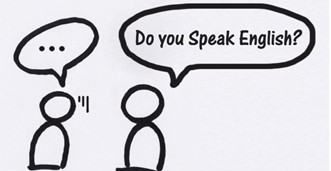
扩展资料:
组成句子的各个部分叫做句子成分。主语和谓语是句子的主体部分,其他处于次要部分。英语中的基本句型为主语+谓语;主语+谓语+宾语;主语+连系动词+表语;主语+谓语+间接宾语+直接宾语;主语+谓语+宾语+宾语补足语。
参考资料:百度百科——句子成分
初中英语成分例句分析及详解
1. 主语(subject):句子说明的人或事物。
The sun rises in the east (名词) He likes dancing. (代词)
Twenty years is a short time in history. (数词) Seeing is believing. (动名词)
To see is to believe.(不定式) What he needs is a book.(主语从句)
It is very clear that the elephant is round and tall like a tree.
(It形式主语,主语从句是真正主语)
(一)指出下列句中主语的中心词
① The teacher with two of his students is walking into the classroom.
② There is an old man coming here.
③ The useful dictionary was given by my mother last year.
④ To do today's homework without the teacher's help is very difficult.
2. 谓语(predicate):是对主语加以陈述,表示主语的行为或状态,常用动词或者动词词组担任,放在主语的后面。
We study English. He is asleep.
(二). 选出句中谓语的中心词
① I don't like the picture on the wall. A. don't B. like C. picture D. wall
② The days get longer and longer when summer comes. A. get B. longer C. days D. summer
③ Do you usually go to school by bus? A. Do B. usually C. go D. bus
④ There will be a meeting at the library this afternoon.
A. will be B. meeting C. the library D. afternoon
⑤ Did the twins have porridge for their breakfast? A. Did B. twins C. have D. breakfast
3. 表语(predicative):系动词之后的成分,表示主语的性质、状态和特征。
He is a teacher. (名词) Seventy-four! You don’t look it. (代词)
Five and five is ten. (数词) He is asleep. (形容词)
His father is in.(副词) The picture is on the wall. (介词短语)
My watch is gone / missing / lost. (形容词化的分词)
The question is whether they will come. (表语从句)
(常见的系动词有: be, sound(听起来), look(看起来), feel(摸起来,smell(闻起来), taste(尝、吃起来), remain(保持,仍是), feel(感觉)……
It sounds a good idea. The sound sounds strange.
Her voice sounds sweet. Tom looks thin.
The food smells delicious. The food tastes good.
The door remains open. Now I feel tired.
(三) 挑出下列句中的表语
① The old man was feeling very tired. ② Why is he worried about Jim?
③ The leaves have turned yellow. ④ Soon They all became interested in the subject.
⑤ She was the first to learn about it.
4. 宾语:1)动宾表示行为的对象,常由名词或者代词担任。放在及物动词或者介词之后。如:
I like China. (名词) He hates you. (代词)
How many do you need? We need two. (数词)I enjoy working with you. (动名词)
I hope to see you again. (不定式) Did you write down what he said? (宾语从句)
2) 介词后的名词、代词和动名词-----介宾
Are you afraid of the snake? Under the snow, there are many rocks.
3) 双宾语-----间宾(指人)和直宾(指物)
He gave me a book yesterday. Give the poor man some money.
(四) 挑出下列句中的宾语
① My brother hasn't done his homework.
② People all over the world speak English.
③ You must pay good attention to your pronunciation.
④ How many new words did you learn last class?
⑤ Some of the students in the school want to go swimming, how about you?
5. 宾补:对宾语的补充,全称为宾语补足语。
We elected him monitor. (名词) We all think it a pity that she didn’t come here. (名词)
We will make them happy. (形容词) We found nobody in. ( 副词 )
Please make yourself at home. (介词短语) Don’t let him do that. (省to不定式)
His father advised him to teach the lazy boy a lesson. (带to不定式)
Don’t keep the lights burning. (现在分词) I’ll have my bike repaired. (过去分词)
(五) 挑出下列句中的宾语补足语
① She likes the children to read newspapers and books in the reading-room.
② He asked her to take the boy out of school.
③ She found it difficult to do the work.
④ They call me Lily sometimes.
⑤ I saw Mr. Wang get on the bus.
⑥ Did you see Li Ming playing football on the playground just now?
6. 定语:修饰或限制名词或代词的词、词组或句子。
Ai Yanling is a chemistry teacher.(名词) He is our friend. (代词)
We belong to the third world.(数词) He was advised to teach the lazy boy a lesson.(形容词)
The man over there is my old friend.(副词)
The woman with a baby in her arms is my sister. (介词)
The boys playing football are in Class 2. (现在分词)
The trees planted last year are growing well now. (过去分词)
I have an idea to do it well.(不定式) You should do everything that I do. (定语从句)
(六) 挑出下列句中的定语
① They use Mr., Mrs. with the family name.
② What is your given name?
③ On the third lap are Class 1 and Class 3.
④ I am afraid some people forgot to sweep the floor.
⑤ The man downstairs was trying to sleep.
7. 状语:用来修饰v., adj., adv., or 句子。表示时间、地点、原因、目的、结果、程度、条件、方式和让步。(以下例句按上述顺序排列)
I will go there tomorrow. The meeting will be held in the meeting room.
The meat went bad because of the hot weather. He studies hard to learn English well.
He didn’t study hard so that he failed in the exam. I like some of you very much.
If you study hard, you will pass the exam. He goes to school by bike.
Though he is young, he can do it well.
(七) 挑出下列句中的状语
① There was a big smile on her face.
② Every night he heard the noise upstairs.
③ He began to learn English when he was eleven.
④ The man on the motorbike was travelling too fast.
⑤ With the medicine box under her arm, Miss Li hurried off.
(八) 划出句中的直接宾语和间接宾语
① Please tell us a story.
② My father bought a new bike for me last week.
③ Mr. Li is going to teach us history next term.
④ Here is a pen. Give it to Tom.
⑤ Did he leave any message for me?
参 考 答 案
(一) ① teacher ② man ③ dictionary ④ To do
(二) ① B ② A ③ C ④ A ⑤ C
(三) ① tired ② worried ③ yellow ④ interested ⑤ first
(四) ① his homework ② English ③ your pronunciation ④ new words ⑤ to go swimming
(五) ① to read newspapers and books in the reading-room ② to take the boy out of school
③ Lily ④ get on the bus ⑤ playing football on the playground
(六) ① family ② given ③ third ④ some ⑤ downstairs
(七) ① on the face ② Every night ③ when he was eleven ④ fast ⑤ off
(八) ① us, 间接宾语 a story, 直接宾语 ② me, 间接宾语 a new bike, 直接宾语
③ us, 间接宾语 history, 直接宾语 ④ Tom, 间接宾语 it, 直接宾语
⑤ me, 间接宾语 message, 直接宾语
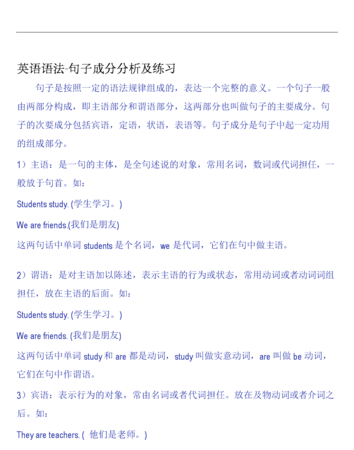
句子成分分析50个例句
1、同学们(主语)都(状语) 跑来了(谓语),从操场上,从教室里,从学校的每个角落里(都是状语) 2、他踉踉跄跄地从外地赶回久别的家乡。
3、[早在13世纪],卢沟桥‖[就]闻名<世界>。
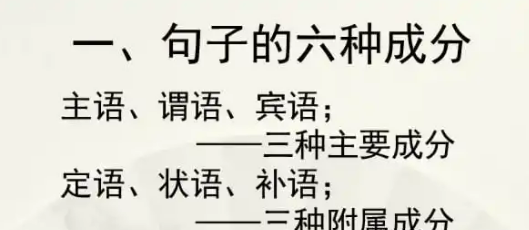
4、小学校显得那样幽静而又神秘。
5、一位手里拿着照相机的(定语)记者(主语)一声不响地(状语)解了(谓语)系在自己腰带里的(定语)那条结实的粗(定语)绳子(宾语)。
6、他(主)踉踉跄跄地(状)从外地(状)赶回(谓)久别的(定)家乡(宾)。
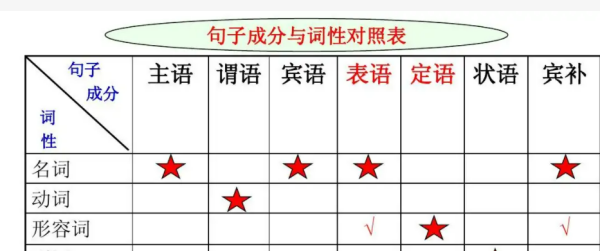
7、连长(主)命令(谓)我们(宾)马上休息(宾补)。
8、特点:A、经常由动词、形容词充当。
9、乔家(主语)忽而(状语)遭了(谓语)一场很大的(定语)变故(宾语)。
10、花的(定语)植株(主语)有(谓语)庞大的(定语)根系(宾语)。
英语句子成分分析 悬赏50
这是一个很不完整的句子,原句是一句不成句的短语。So
承上启下,引出下文。之后由
if
引出条件状语,紧接着就是由
who
引出一个定语从句,直到末了。没有主句。
要知道什么是主语补足语,先得理解什么是宾语补足语。请看例句:We
made
John
to
buy
lunch
for
us.(我们让约翰帮我们买午饭。)这句中动词
made
是使役动词,宾语
John
是宾语,不定式
to
buy
lunch
是
John
的宾语补足语。现在我们把这句句子改为被动语态结构:John
was
made
to
buy
lunch
for
us.
此时,原来的宾语
John
在被动语态里成为主语,那么,to
buy
lunch
就成为主语补足语。因此,在原句中没有主语补语。
宾语有若干个:to
get
their
emain
and
calendar
updates
做needs
的宾语;their
and
calendar
updates
做
get
的宾语。
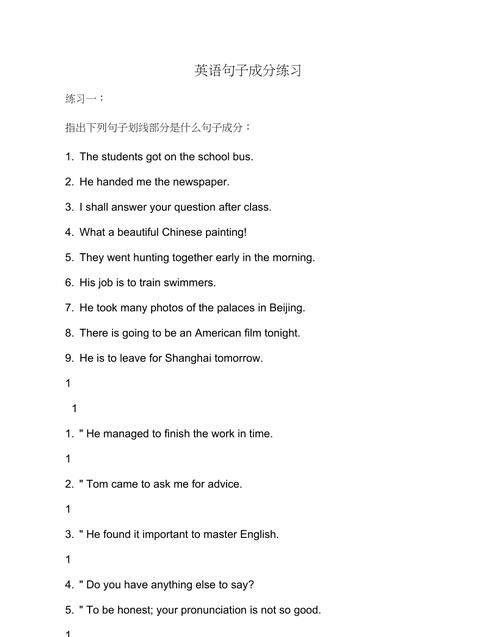
以上就是关于句子成分分析50个例句英语 ,几个英语句子成分分析详细速回的全部内容,以及句子成分分析50个例句英语 的相关内容,希望能够帮到您。
